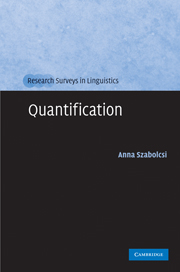Book contents
- Frontmatter
- Contents
- List of figures
- List of tables
- Acknowledgements
- 1 What this book is about and how to use it
- 2 Generalized quantifiers and their elements: operators and their scopes
- 3 Generalized quantifiers in non-nominal domains
- 4 Some empirically significant properties of quantifiers and determiners
- 5 Potential challenges for generalized quantifiers
- 6 Scope is not uniform and not a primitive
- 7 Existential scope versus distributive scope
- 8 Distributivity and scope
- 9 Bare numeral indefinites
- 10 Modified numerals
- 11 Clause-internal scopal diversity
- 12 Towards a compositional semantics of quantifier words
- Notes
- Bibliography
- Index
11 - Clause-internal scopal diversity
Published online by Cambridge University Press: 05 June 2012
- Frontmatter
- Contents
- List of figures
- List of tables
- Acknowledgements
- 1 What this book is about and how to use it
- 2 Generalized quantifiers and their elements: operators and their scopes
- 3 Generalized quantifiers in non-nominal domains
- 4 Some empirically significant properties of quantifiers and determiners
- 5 Potential challenges for generalized quantifiers
- 6 Scope is not uniform and not a primitive
- 7 Existential scope versus distributive scope
- 8 Distributivity and scope
- 9 Bare numeral indefinites
- 10 Modified numerals
- 11 Clause-internal scopal diversity
- 12 Towards a compositional semantics of quantifier words
- Notes
- Bibliography
- Index
Summary
The Montague/May/Hendriks-style approach has a single scope-assignment strategy and therefore predicts that all DPs have the same scope behavior. Starting with Chapter 6 we have seen that this prediction is incorrect; the recognition of this fact has played a key role in rethinking the treatment of quantifier phrases. Three main classes have emerged from the foregoing discussion. The first two classes, plural (in)definites and singular universals, both have unbounded existential scope, but the distributive vs. collective readings of (in)definites depend on the predicate, whereas every NP associates with a special functional head, Dist. The third class is that of counting quantifiers, which do not take extra-clausal scope. The three main classes also differ clause-internally. In languages like English, where quantifier scope is rarely disambiguated by word order and intonation, this manifests itself in differences in the ability to take inverse distributive scope.
This chapter supplements §2.3.4 with a survey of the current generative syntactic approaches to clause-internal scope, with an emphasis on how they account for scopal diversity, and comments on how the treatment of scope relates to certain general assumptions of syntactic theory. We start with a quick recapitulation of the basic data in §11.1 and a characterization of the feature-checking and the economy approaches in §11.2. They are discussed in some detail in §11.3 and §11.4. §11.5 concludes with cross-linguistic variation.
The basic facts
Most of the data in (1) through (6) have been introduced in previous sections.
- Type
- Chapter
- Information
- Quantification , pp. 177 - 188Publisher: Cambridge University PressPrint publication year: 2010



